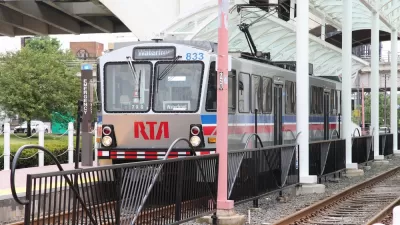Most college campuses in the United States are inherently walkable, mixing various uses with diverse housing options and transit networks.

In an article for the University of Washington’ The Daily, Nicole McMillan highlights how college campuses mirror the qualities that many urbanists value most in communities: mixed use, walkability, access to transit, and dense housing. Unfortunately, McMillan writes, “For many people, college is the first and only time they live within a walkable community.”
McMillan outlines the—to urbanists—well-known history of car dependence, massive highway projects, and urban renewal in the United States, as well as the unique qualities of college life that make campuses ideal social communities.
For McMillan, this points to the fact that “When areas prioritize pedestrians in their infrastructure, the result is a happier and healthier population.” Campuses also offer a higher-than-average number of ‘third places,’ the spaces between home and school or work that allow people to relax, meet, socialize, and have random interactions.
To maintain the communal college atmosphere after graduation, McMillan recommends continuing to seek out your own third places, those where you’ll meet people who challenge your existing perspectives and help you grow.
FULL STORY: Escaping the suburban sprawl: what college campuses teach us about walkable communities

Maui's Vacation Rental Debate Turns Ugly
Verbal attacks, misinformation campaigns and fistfights plague a high-stakes debate to convert thousands of vacation rentals into long-term housing.

Planetizen Federal Action Tracker
A weekly monitor of how Trump’s orders and actions are impacting planners and planning in America.

In Urban Planning, AI Prompting Could be the New Design Thinking
Creativity has long been key to great urban design. What if we see AI as our new creative partner?

Florida Seniors Face Rising Homelessness Risk
High housing costs are pushing more seniors, many of them on a fixed income, into homelessness.

Massachusetts Budget Helps Close MBTA Budget Gap
The budget signed by Gov. Maura Healey includes $470 million in MBTA funding for the next fiscal year.

Milwaukee Launches Vision Zero Plan
Seven years after the city signed its Complete Streets Policy, the city is doubling down on its efforts to eliminate traffic deaths.
Urban Design for Planners 1: Software Tools
This six-course series explores essential urban design concepts using open source software and equips planners with the tools they need to participate fully in the urban design process.
Planning for Universal Design
Learn the tools for implementing Universal Design in planning regulations.
Gallatin County Department of Planning & Community Development
Heyer Gruel & Associates PA
JM Goldson LLC
City of Camden Redevelopment Agency
City of Astoria
Transportation Research & Education Center (TREC) at Portland State University
Jefferson Parish Government
Camden Redevelopment Agency
City of Claremont





























